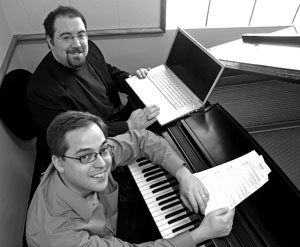The University of Arizona’s College of Social and Behavioral Sciences hosted their 6th annual lecture series in Downtown Tucson. This year’s theme was on “Music, Place, and Identity.”
Music shapes the lives of people and helps identify certain cultures, lifestyles and different places around the world.
This lecture series included faculty from the College of Social and Behavioral Sciences and local musicians/artists. UA professors who spoke at the lectures included Jake Harwood, Tyina Steptoe, Maurice Rafael Magaña and Celestino Fernández. Their lectures focused on music and how the power of music shapes the lives of people and everyday life.
Topics discussed were: how different music genres blend together to create cultural sounds, how music shapes people in certain places and ways that this music influences art and lifestyles.
RELATED: Film Student explores immigrant’s first Thanksgiving
The Soundscapes lectures were held at the Fox Theater downtown on Thursdays throughout the month of October. The lectures were free of charge, but tickets to the event could be reserved beforehand. Each lecture was an hour and a half, engaging the audience with musical performances and questions from the professors.
The Soundscape lectures began because the College of Social and Behavioral Sciences wanted to highlight important questions of community, cultural experiences and humanity, according to Maribel Alvarez, associate dean of community engagement for the College of Social and Behavioral Sciences.
“We thought music was one of those overlooked dimensions that is so much around us, that frames so many of the critical moments of our lives,” Alvarez said.
This year’s lecture series topics were Music: All This Useless Beauty?, From Little Richard to Beyoncé: Cultural Blending in Music, Hip Hop Culture and its Visual Impact in Mexico and the last lecture, Norteño, Corridos, and Mariachi: Culture and Conflict in Border Music.
The community has continued to come to these lectures every year in large crowds, according to Alvarez.
“Hundreds of people come, around anywhere from 800-1,000 people come, to these lectures,” Alvarez said. “They are not all university people, they are not faculty, they are not all students. This is part mission of the university to share knowledge.”
People may hear about the event through UA News, flyers and other people who have attended the event before, according to Felicity Carr, a participant who attended because of a friend’s invitation.
“I kind of consider music and being involved in music [to have helped] me become who I am today, just because it was a big part of my life growing up,” Carr said.
The college wanted to shed light on how music is influential in people’s lives and cultural background as well as highlight the importance of how culture and art is impacted through music, according to Alvarez.
The last lecture of the series, Norteño, Corridos, and Mariachi: Culture and Conflict in Border Music, discussed the ways border music influences culture all around the southern United States.
The lecturer, Celestino Fernández, talked about how these types of music have lyrics about social issues going on within the world, such as politics, mass shootings and drug trafficking.
“I love music, any kind of music, I’ve been coming to all of the [Soundscapes] events,” said Hiram Peña, an attendee at this year’s Soundscapes lectures.
People who came to the Soundscape lectures wanted to learn more about the music that was being discussed and performed.
“I am from Mexico, so I want to know what [Fernández] is going to talk about, how both cultures from the U.S. and Mexico blend together,” Peña said.
RELATED: Locksmith University: The Forgotten Lot
Many of the attendees who came to listen to the lectures were students, UA staff and community members from various backgrounds.
The importance of the sharing the knowledge of how music is impactful on people and lifestyles around the globe, not just here in Arizona, is what the College of Social and Behavioral Sciences wanted to bring to the community, according to Alvarez.
“They speak to everyday life and the concerns and interests of everyday people,” Alvarez said.
Bringing an open discussion about music and how music in influential to people’s lives, while also at the same time making people leave with questions and thinking about the topics that were discussed, was the goal of the university, according to Alvarez.
“We hope that everybody walks out of the lectures and at least scratches their head a little bit and say, ‘OK I didn’t know that, or I am now going to think about that [topic] a little more,’” Alvarez said.
The UA College of Social and Behavioral Sciences puts together a one-month lecture series every year, with a different focus each year, according to Alvarez.
Follow Briannon Wilfong on Twitter









